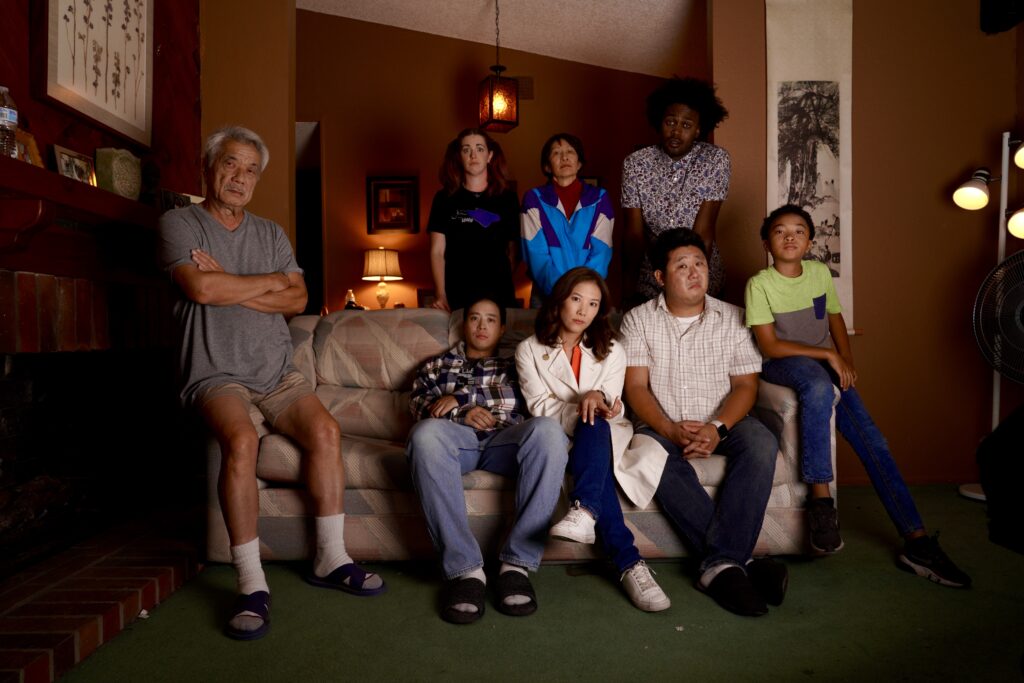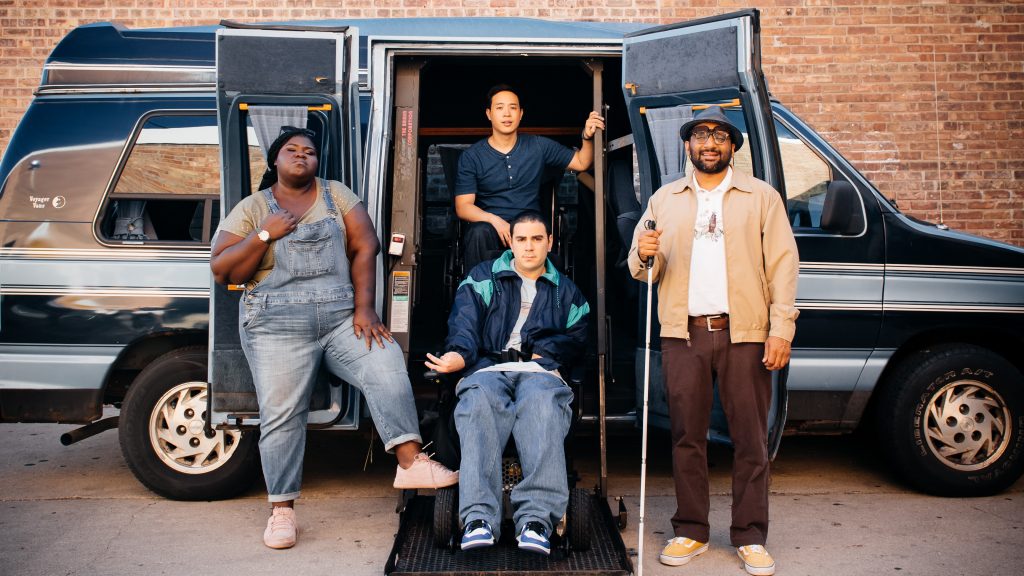June 2, 2023
by Carla Hay

Directed by Tom Huang
Some language in Mandarin with subtitles
Culture Representation: Taking place primarily in Milpitas, California, the comedy/drama film “Dealing With Dad” features a predominantly Asian cast of characters (with a few white people and African Americans) representing the middle-class and working-class.
Culture Clash: Three siblings in their 30s gather at their parents’ home, where their father is having depression issues, and long-simmering family resentments come to the surface.
Culture Audience: “Dealing With Dad” will appeal primarily to people who are interested in bittersweet dramedies about immigrant families, sibling rivalries, and how childhood experiences affect people through adulthood.

“Dealing With Dad” is a generally entertaining dramedy about a specific family with universally relatable issues. Some of the jokes are a little corny, but the movie gets better as it goes along. Ally Maki gives an impressive performance as a Type-A perfectionist with daddy issues. “Dealing With Dad” does an overall capable job of balancing family drama and comedy.
Written and directed by Tom Huang, “Dealing With Dad” (which takes place mostly in Milpitas, California) has many of the predictable arguments and squabbles that are usually found in movies about family reunions where family members have long-held resentments and grudges. The family at the center of this story isn’t completely dysfunctional, but most of the family members have problems communicating openly and honestly with each other. They are forced to reckon with many of their issues when the family patriarch becomes bedridden with depression after being laid off from his accounting job.
Jialuo Chang (played by Dana Lee), an immigrant from Taiwan, is cranky and impatient with everyone around him. Jialuo’s self-confidence of being his household’s main financial provider gets a big blow after he becomes unemployed. It’s later revealed in the movie that Jialuo was verbally abusive and sometimes physically abusive to his three children when they were underage. Jialuo currently lives in Milpitas, California, in the same house where he and his wife raised their three American-born children during most of the kids’ childhoods.
Sophie Chang (played by Page Leong) is Jialuo’s often-demanding and judgmental wife, who is also an immigrant from Taiwan. Sophie is openly racist against people who aren’t Asian. She tells her children that she wants them to marry only Asian people. Sophie hides her racism by being smiling and polite to people whom she makes racist comments about behind their backs.
Margaret Chang-Atlas (played by Ally Maki) is an uptight, hard-driving business entrepreneur who likes to be in control of situations. Margaret is actually fearful of disappointing her parents, especially her father. Ironically, Margaret can be just as prickly and difficult with other people as her parents are with her. How much of a control freak is Margaret? There’s a scene in the movie where she and her two brothers are eating at a casual restaurant, and she cuts the food on the plate of the younger brother, as if he’s a helpless child.
Margaret knows her mother doesn’t approve of Margaret being married to an African American musician named Jeff Atlas (played by Echo Kellum), who does not have the type of career that Sophie and Jialuo think is suitable for a spouse. Sophie privately uses the derogatory term “half-breed” to describe Margaret and Jeff’s son Nick (played by Caleb Mantuano), who’s about 7 or 8 years old. But when Sophie is around Nick, she acts like a doting and loving grandmother.
Roy Chang (played by Peter S. Kim) is Margaret’s older brother. He works as a bank manager and is feeling down about his life because his wife Sherry is divorcing him. Roy doesn’t want the divorce and is hoping that he and Sherry can reconcile. He is also sensitive about his body size and gets defensive when his siblings make negative comments about the large portions of food that he eats.
Larry Chang (played by Hayden Szeto) is Margaret’s younger brother. He is 33 years old, a never-married bachelor, unemployed, and currently living with his parents. Larry is a self-described sci-fi nerd who spends a lot of his time and money on collecting sci-fi memorabilia and playing video games. Larry makes a small amount of money by selling his memorabilia at a local comic book/collectible store managed by Aaron (played by Ari Stidham), another sci-fi enthusiast. Larry owes Roy a certain amount of money that is not specified, but it’s enough money that causes Roy to resent Larry.
Jenny (played by Cindera Che) is Jialuo’s younger sister, who lives in Denver, but she goes to Milpitas after hearing about Jialuo’s mental health issues. For years, Jenny has been openly hostile or standoffish to Margaret, who doesn’t know why. During the course of the movie, the reason why is revealed.
Margaret and Roy both live far enough away from their parents that when they both find out that their father is bedridden, Roy and Margaret reluctantly take a plane ride to go to their parents’ home in Milpitas. Margaret’s husband and son don’t go with her. Before this family crisis, Margaret hadn’t talked to her parents in months.
The first half of “Dealing With Dad” is structured and written almost like a sitcom, with a bunch of family members making verbal zingers and lobbying sarcastic insults at each other. It starts to get very repetitive, but not completely boring. Jialuo has become very reclusive, so he is not seen for much of the movie. The three siblings are somewhat relieved that they don’t have to deal with Jialuo’s usual tryannical bossiness, but his wife Sophie causes a lot of drama.
There’s a subplot about Larry reconnecting with a goofy former high-school classmate named Sarah Schumer (played by Megan Gailey), who has recently moved back to the area after serving time in the Peace Corps. Larry has had a crush on Sarah since high school. She has many of the same interests as Larry does, and she likes him, but he is too shy to ask her out on a date.
Meanwhile, a nerdy doctor named Gordon, also known as Gordy (played by Karan Soni), who is a former high-school classmate of Margaret’s, stops by for a house call to treat Jialuo. Sophie is impressed that Gordon is a doctor, so she makes awkward attempts to play matchmaker between Margaret and Gordon, even though neither one is romantically interested in the other. Sophie also tries to set up Larry with a quiet Chinese immigrant named Cai Shi (played by Peggy Lu), who’s about 25 years older than Larry.
Gordon prescribes Zoloft to Jialuo and recommends that Jialuo get therapy for the depression. Jialuo is too proud to accept that he needs this help. The movie takes a much more serious turn when tensions run even higher because Jialou refuses to take the Zoloft. He literally throws the pills across the room. And in one incident, he spits a Zoloft pill in Margaret’s face.
The siblings’ battle to get Jialuo to take his prescribed Zoloft becomes a symbol for the grudges that all three of his children have against him. Margaret has the most resentment toward her father, so she’s the one who fights the most to get him to take the Zoloft pills. Flashbacks to Margaret’s childhood show that Jialuo was the hardest on her, out of all his three children, because he had the highest expectations for Margaret. Miya Cech has the role of Margaret at about 12 or 13 years old.
In one of these flashback scenes, Margaret has a painful memory of Jialuo slapping her hard in the face in front of her softball teammates, after she joyfully told him that she made it onto the softball team. Instead of being happy for her, Jialuo got angry and assaulted her for having “B” grades on her report card. Later, he gave her an apology gift of new softball gloves, which the adult Margaret says are the only signs that she has that Jialuo might have loved her.
“Dealing With Dad” also shows Margaret’s anxiety issues. She has a recurring nightmare that she’s trapped in a narrow hallway that has a tidal wave of flooding that’s about to drown her. Although Margaret likes to put forth an image to the world that she’s got her whole life together, this vulnerable side to her gives the movie more emotional depth. And she’s not a completely sympathetic protagonist, because she has a tendency to act superior to her brothers and other people. It’s a personality flaw that Margaret gets confronted about at one point in the story.
“Dealing With Dad” also has authentic depictions of the dynamics between immigrant parents and their children who were born and raised in the country where the parents immigrated. Jialuo and Sophie want to tightly hold on to their “old school” Taiwanese traditions and have a hard time accepting that their children might not feel the same way. Those traditions include a reluctance to get psychiatric help for mental health issues.
All of the cast members give performances that range from mediocre to very good. The movie is told mainly from Margaret’s perspective, so Maki has the most challenging role, because of the myriad of emotions that she has to convey. The pace of the movie occasionally drags in the middle, but the last third of the film is the best part. Just when you think “Dealing With Dad” might end on an expected formulaic note, it surprisingly shows that, just like in real life, not everyone is going to change annoying personality traits just because of a family reunion.
1091 Pictures/Screen Media Films released “Dealing With Dad” in select U.S. cinemas on April 16, 2023. The movie was released on digital and VOD on May 9, 2023.


